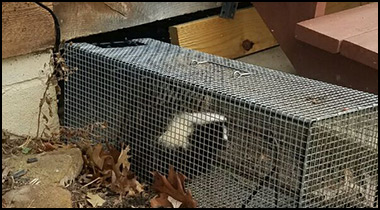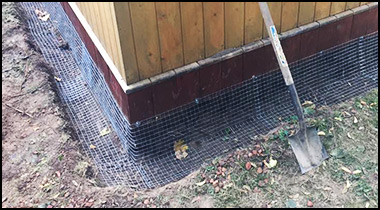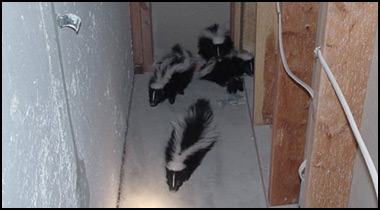Hackensack Skunk Removal Resources
Skunk Rehabber - William T. Davis Wildlife Refuge: (212) 639-9675
Free Bergen County Animal Services: 201-646-3200
Humane Wildlife Trappers of Hackensack: 201-328-0537
If you need skunk control in Hackensack, you have a few options. First, you can attempt to solve the skunk problem yourself by reading our do-it-yourself guide. If you need outside help, you can also call Bergen County Animal Services to see if they have any free resources or help for you - however, they primarily deal with dog and cat concerns. You can also call a local Hackensack wildlife rehabber, as they are typically a great resource for advice that is in the best welfare of the animal. If as a last resort you must hire a professional company, we recommend Humane Wildlife Trappers of Hackensack at 201-328-0537. To learn more about them or check their skunk removal prices, visit bergencountypestanimal.com.

Hackensack Skunk Trapping and Removal

Preventative Repairs & Exclusion

Hackensack Skunk Removal From Structures
In many cases, preventative measures can solve your Hackensack skunk problem - keep garbage secured, pet food indoors, and most of all when it comes to skunks, secure the perimeter of your shed, porch, deck, or house with a barrier - lattice or steel mesh is good, and it keeps New Jersey skunks from going under the structure. If trapping and removal of the skunk is the only option you have, please do so with the help of a local agency or professional company who knows how to do it humanely and legally. Browse the resources of this site for more educational information.
Frequently Asked Questions:
Prevention: How to Keep Skunks Away
What to do with a skunk after I catch it?
Is it legal for me to trap a skunk?
How to remove skunk odor
Is a skunk active during the daytime rabid?
What does skunk feces look like?
Hackensack Skunk Control Information: Humane Ways to Kill a Trapped Skunk
Your goal in trapping a skunk should always be to relocate it to a more appropriate place to live. Some people simply cannot stand the musky scent or fear of being sprayed. If trapping is your only option, do it as humanely as possible to ensure the skunk remains unharmed and calm. Also of concern is whether or not there are any dependent juveniles with the adult. That may make things considerably more difficult.
If loosely packing the den's opening with leaves, straw, or even used kitty litter has not caused them to move along on their own, you may be force to trap and relocate the skunk. Deterrents to avoid are things like store-bought skunk repellent. That is most commonly manufactured with inhumanely acquired predator urine. Remember, the ultimate goal is to be as humane as possible, all the way around.
Skunks are an extremely laidback animal, so killing them should not be a consideration unless there is something clearly wrong with the animal. If the skunk is merely injured, a wildlife rehabilitation organization may be able to nurse them back to health. They can then successfully release them back into nature.
There are a few signs to look for, however, that will tell you whether or not a skunk acting strangely should be killed. They are one of four primary animals to carry the rabies virus. Skunks have also been known to carry leptospirosis. That is a disease caused by a bacteria and can lead to a number of serious conditions, including death.
With these two concerns in mind, check the skunk for things such as uncharacteristic and unprovoked aggression, balance issues such as staggering or limb paralysis. Even tameness in a wild animal, if it is uncharacteristic and the skunk should be afraid or you, could be a sign.
In cases where rabies is presumed, allow a trained professional, such as a game warden, make the call on whether or not the skunk should be killed. They have experience dealing with them and will terminate the animal as humanely as possible to avoid prolonged suffering. Never inject them with chemicals, poisons, or drown them. The skunk will suffer horribly. It is unnecessary and cruel. Ultimately, if you do not know what to do or how to proceed, call someone who can with the proper tools and in the best manner for the skunk
Remember, for free services you can try (212) 639-9675 or 201-646-3200, but if you need to pay for professional help, check the prices at the bergencountypestanimal.com website. Or follow our do-it-yourself guide!

